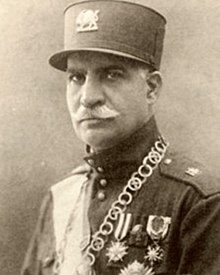Shah Reza
| Full name | |
|---|---|
|
Reza Shah Pahlavi Persian: رضا شاه پهلوی |
|
Styles of Reza Shah of Iran |
|
|---|---|
 |
|
| Reference style | His Imperial Majesty |
| Spoken style | Your Imperial Majesty |
| Alternative style | Sir |
15 December 1925 –
Reza Shah Pahlavi (Persian: رضا شاه پهلوی; pronounced [reˈzɑː ˈʃɑːhe pæhlæˈviː]; 15 March 1878 – 26 July 1944), was the Shah of Iran (Persia) from 15 December 1925 until he was forced to abdicate by the Anglo-Soviet invasion of Iran on 16 September 1941.
Four years after conducting a coup against the pro-British government, the 1921 Persian coup d'état, in 1923 Reza Pahlavi was selected as Iran's prime minister by the National assembly of Iran. In 1925 Rezā Pahlavi was appointed as the legal monarch of Iran by decision of Iran's constituent assembly. The assembly deposed Ahmad Shah Qajar, the last Shah of the Qajar dynasty, and selected Reza Shah and Pahlavi dynasty instead, by amending the Iran's 1906 constitution. Reza Shah was the first democratically elected monarch of Iran. He founded the Pahlavi dynasty. He established a constitutional monarchy that lasted until overthrown in 1979 during the Iranian Revolution. Reza Shah introduced many social, economic, and political reforms during his reign, ultimately laying the foundation of the modern Iranian state.
His legacy remains controversial to this day. His defenders assert that he was an essential modernizing force for Iran (whose international prominence had sharply declined during Qajar rule), while his detractors assert that his reign was often despotic, with his failure to modernize Iran's large peasant population eventually sowing the seeds for the Iranian Revolution nearly four decades later which ended 2500 years of Persian monarchy. Moreover, his insistence on ethnic nationalism and cultural unitarism along with forced detribalization and sedentarization resulted in suppression of several ethnic and social groups. Similar to Atatürk's policy of Turkification his government also carried out an extensive policy of Persianization trying to create a single, united and largely homogeneous nation.
...
Wikipedia

